

A People's History of the United States. The Note: This great book should really be read by everyone.
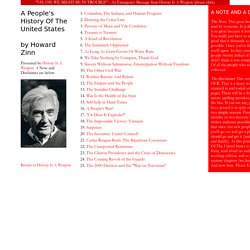
It is difficult to describe why it so great because it both teaches and inspires. You really just have to read it. We think it is so good that it demands to be as accessible as possible. Once you've finished it, we're sure you'll agree. Amazon.com: Panasonic KX-TG6592T DECT 6.0 Amplified Sound Cordless Phone with Answering System, Metallic Black, 2 Handsets: Electronics.
Anthropology. General knowledge. Rabindranath Tagore. Rabindranath Tagoreβ[›] (Bengali pronunciation: [rəˈbindrəˈnɑt ˈtɑɡɔr] ( )), also written Rabīndranātha Thākura (Bengali: রবীন্দ্রনাথ ঠাকুর; pronounced: [rəˈbindrəˈnɑtə ˈtɑkʊrə]),[2] (7 May 1861 – 7 August 1941),γ[›] sobriquet Gurudev,δ[›] was a Bengali polymath who reshaped his region's literature and music.
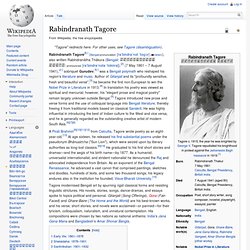
Author of Gitanjali and its "profoundly sensitive, fresh and beautiful verse", he became the first non-European to win the Nobel Prize in Literature in 1913. In translation his poetry was viewed as spiritual and mercurial; however, his "elegant prose and magical poetry" remain largely unknown outside Bengal. Tagore introduced new prose and verse forms and the use of colloquial language into Bengali literature, thereby freeing it from traditional models based on classical Sanskrit. He was highly influential in introducing the best of Indian culture to the West and vice versa, and he is generally regarded as the outstanding creative artist of modern South Asia.[7][8] Quantum Mechanics Wiki. Quantum Mechanics. Reference, Facts, News - Free and Family-friendly Resources - Refdesk.com.
The Way We Are: It Started with the Greeks (Day the Universe Changed - Ep 1) Mind Mapping. A People's History of the United States.
Philosophers: Alphabetical Index. Untitled Document. Ludwig Wittgenstein. Ludwig Josef Johann Wittgenstein (26 April 1889 – 29 April 1951) was an Austrian-British philosopher who worked primarily in logic, the philosophy of mathematics, the philosophy of mind, and the philosophy of language.[4] From 1939–1947, Wittgenstein taught at the University of Cambridge.[5] During his lifetime he published just one slim book, the 75-page Tractatus Logico-Philosophicus (1921), one article, one book review and a children's dictionary.[6] His voluminous manuscripts were edited and published posthumously.
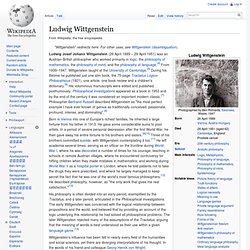
Philosophical Investigations appeared as a book in 1953 and by the end of the century it was considered an important modern classic.[7] Philosopher Bertrand Russell described Wittgenstein as "the most perfect example I have ever known of genius as traditionally conceived; passionate, profound, intense, and dominating".[8] Born in Vienna into one of Europe's richest families, he inherited a large fortune from his father in 1913. Background[edit] The Wittgensteins[edit] John Searle on Ludwig Wittgenstein: Section 1. Wittgenstein : Language Games. This work is licensed under a Creative Commons Attribution-Share Alike 2.5 License In his later work Wittgenstein developed the idea that the job of philosophy was to clear up the conceptual confusions that arose through our unexamined use of language.
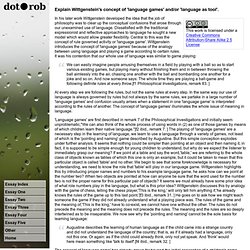
Dissatisfied with the traditional expressionist and reflective approaches to language he sought a new model which would allow greater flexibility. Central to this was the concept of rule governed activity or 'language game'. Wittgenstein introduces the concept of 'language games' because of the analogy between using language and playing a game according to certain rules. It was his contention that our whole use of language was similar to game playing: At every step we are following the rules, but not the same rules at every step.
Augustine describes the learning of human language as if the child came into a strange country and did not understand the language of the country; that is, as if it already had a language, only not this one. On Certainty. On Certainty (German: Über Gewißheit) is a philosophical book composed from the notes written by Ludwig Wittgenstein just prior to his death.
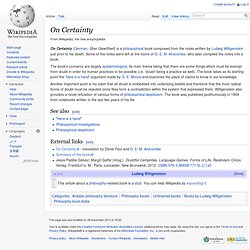
Some of the notes were left at the home of G. E. M. Anscombe, who later compiled the notes into a book. The book's concerns are largely epistemological, its main theme being that there are some things which must be exempt from doubt in order for human practices to be possible (i.e. Truth table. Practically, a truth table is composed of one column for each input variable (for example, A and B), and one final column for all of the possible results of the logical operation that the table is meant to represent (for example, A XOR B).
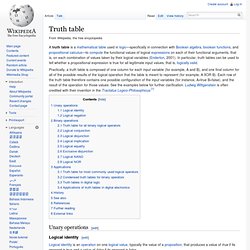
Each row of the truth table therefore contains one possible configuration of the input variables (for instance, A=true B=false), and the result of the operation for those values. See the examples below for further clarification. Ludwig Wittgenstein is often credited with their invention in the Tractatus Logico-Philosophicus.[1] Unary operations[edit] Logical identity[edit]
Ludwig Wittgenstein List of quotes page 1 - phraseoftheday.co.uk. Commentary on Wittgenstein's Philosophical Investigations. Shawver Commentary: This commentary in the pages of this website is not meant to replace your reading of Wittgenstein in the original.
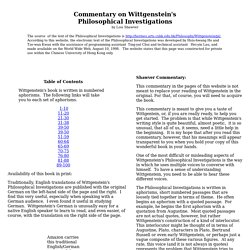
For that, of course, you will need to acquire the book. This commentary is meant to give you a taste of Wittgentein, or, if you are really ready, to help you get started. Immanuel Kant. Immanuel Kant (/kænt/;[1] German: [ɪˈmaːnu̯eːl kant]; 22 April 1724 – 12 February 1804) was a German philosopher who is widely considered to be a central figure of modern philosophy.
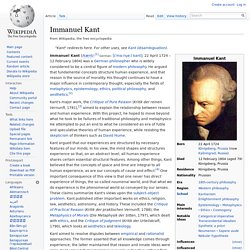
He argued that fundamental concepts structure human experience, and that reason is the source of morality. His thought continues to have a major influence in contemporary thought, especially the fields of metaphysics, epistemology, ethics, political philosophy, and aesthetics.[2] Immanuel Kant Quotes. Friedrich Nietzsche. Friedrich Wilhelm Nietzsche (/ˈniːtʃə/[1] or /ˈniːtʃi/;[2] German: [ˈfʁiːdʁɪç ˈvɪlhɛlm ˈniːt͡sʃə]; 15 October 1844 – 25 August 1900) was a German philosopher, cultural critic, poet, composer and Latin and Greek scholar.
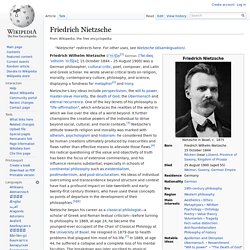
Friedrich Nietzsche Quotes. Aristotle. Aristotle's views on physical science profoundly shaped medieval scholarship.
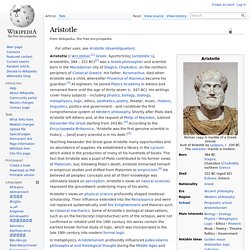
Their influence extended into the Renaissance and were not replaced systematically until the Enlightenment and theories such as classical mechanics. Aristotle Quotes. We become just by performing just actions, temperate by performing temperate actions, brave by performing brave actions. ARISTOTLE, Nicomachean Ethics As for the story, whether the poet takes it ready made or constructs it for himself, he should first sketch its general outline, and then fill in the episodes and amplify in detail.
Poverty is the parent of revolution and crime. Plato. Plato (/ˈpleɪtoʊ/; Greek: Πλάτων Plátōn "broad"pronounced [plá.tɔːn] in Classical Attic; 428/427 or 424/423 – 348/347 BCE) was a philosopher, as well as mathematician, in Classical Greece. He is considered an essential figure in the development of philosophy, especially the Western tradition, and he founded the Academy in Athens, the first institution of higher learning in the Western world.
Along with his teacher Socrates and his most famous student, Aristotle, Plato laid the foundations of Western philosophy and science.[2] Alfred North Whitehead once noted: "the safest general characterization of the European philosophical tradition is that it consists of a series of footnotes to Plato. " Plato Quotes. Poetry is nearer to vital truth than history. The direction in which education starts a man will determine his future life. Confucius. Confucius (551–479 BC)[1] was a Chinese teacher, editor, politician, and philosopher of the Spring and Autumn period of Chinese history. Confucius is traditionally credited with having authored or edited many of the Chinese classic texts including all of the Five Classics, but modern scholars are cautious of attributing specific assertions to Confucius himself.
Aphorisms concerning his teachings were compiled in the Analects, but only many years after his death. Confucius's principles had a basis in common Chinese tradition and belief. He championed strong family loyalty, ancestor worship, respect of elders by their children and of husbands by their wives. Confucius Quotes. Jain philosophy.